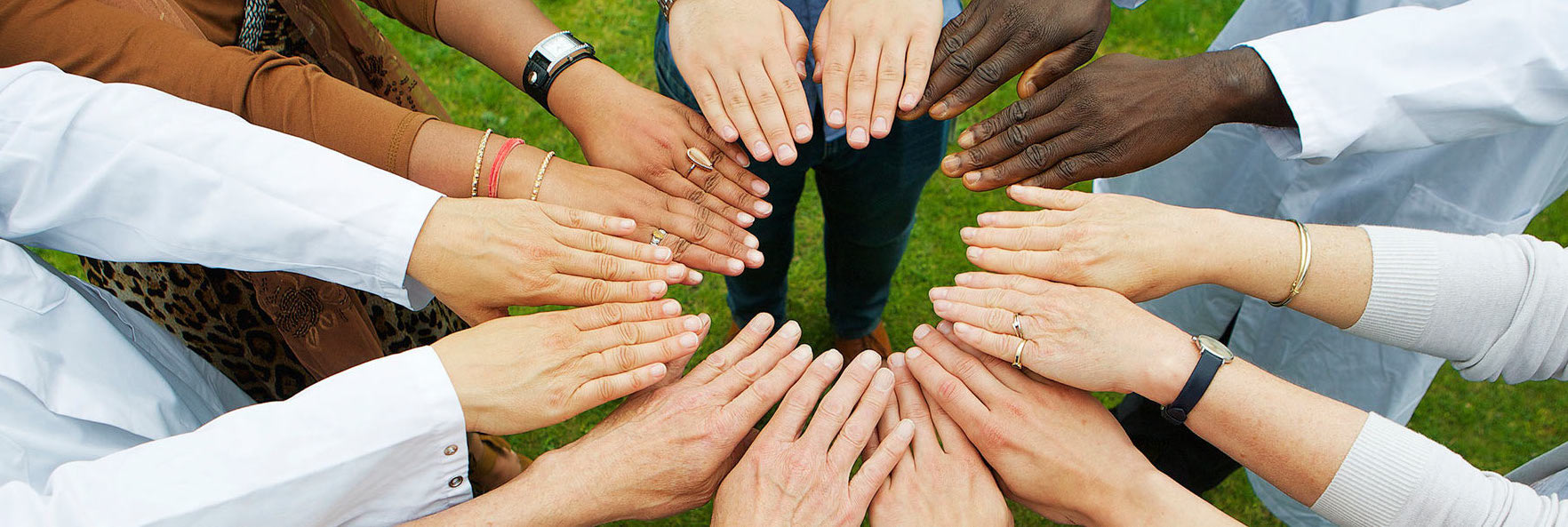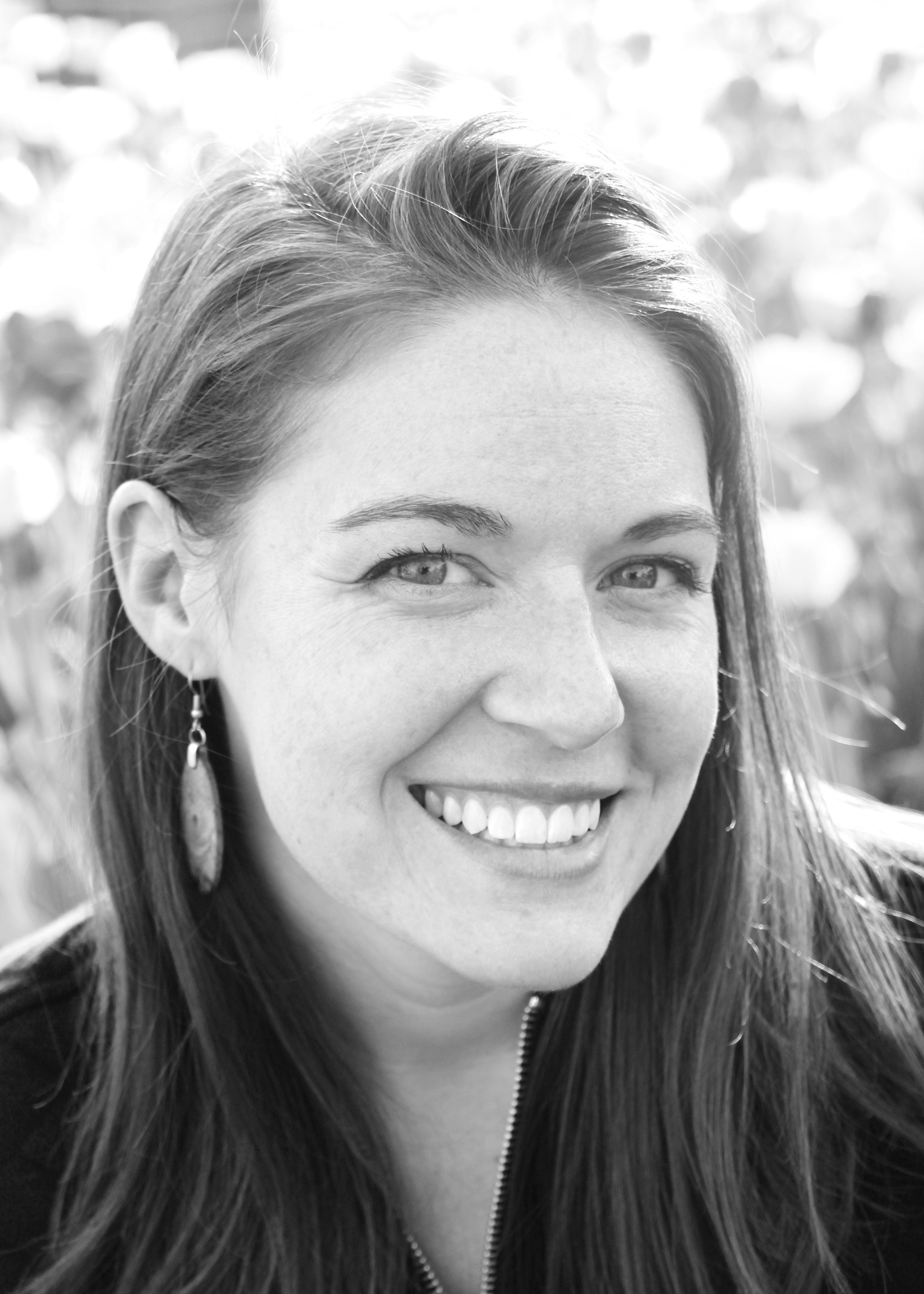In fall 2017, MCH student Virginia Pendleton interviewed MCH Program Alumna Nicole Steffens, MPH (‘12) about her career path. The below captures Nicole’s reflections on her time at the University of Minnesota (UMN), advice for current students and professional work and accomplishments.
An MCH Dream Job
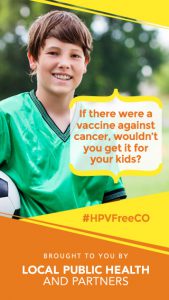
Nicole Steffens works an MCH dream job. As the Human Papillomavirus (HPV) Program Coordinator at Denver Public Health she manages a multi-pronged intervention that aims to increase HPV vaccination rates in Denver adolescents. Nicole’s enthusiasm for her public health work shone through every part of our conversation. As she explained the career and education path she took to get to Denver Public Health, it became clear that Nicole’s ambitious yet flexible mindset about opportunities throughout her MCH education and early career helped her obtain her current role.
In order to understand the multiple levels of public health practice that Nicole operates on, it is necessary to understand the massive scope of the HPV project she manages. Nicole explains that because there are multiple reasons for undesirably low HPV vaccination uptake, the solutions to significantly increase awareness, promotion and demand must be multifaceted and coordinated. Therefore, the interventions the Denver Metro Alliance for HPV Prevention (Alliance) created span all socioecological strata, from individual provider education to a mass media marketing campaign.
Nicole describes the Alliance, and subsequently her role leading a team of 30 people, as being composed of four distinct yet interrelated activities. The first piece is hosting a quarterly meeting for a diverse coalition of key stakeholders and HPV prevention experts in the Denver area. The purpose of these meetings is to collect and disseminate the most up-to-date information on HPV and vaccines so that the public is hearing the same messaging.
The second piece is what Nicole describes as the most challenging but also the most rewarding part of her job: training medical providers in order to encourage them to more consistently recommend the vaccine to all adolescents and their parents. The intervention encourages providers to use a bundled message for the vaccine by simply introducing it with other recommended vaccines for the child’s age.
For example, when providers talk to parents of 11-12 year olds, they should present the need for the Tdap, HPV and meningococcal vaccines the same day and in the same way. Research suggests that by making this recommendation “matter of fact,” more parents will agree to vaccination compared to when the HPV vaccine is presented as a “special or extra” option. Nicole and her team also teach providers how to use motivational interviewing to talk to vaccine-hesitant parents, which has been a very rewarding tool for participating providers.
Communicating with Everyday Audiences
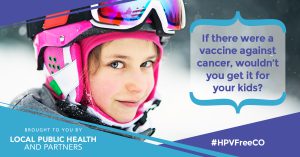 The third piece of Nicole’s job is assisting in the creation, implementation and evaluation of a mass communications campaign that targets mothers 30-55 years old. A key goal ofthe campaign is to promote the message that the HPV vaccine is cancer prevention. The campaign uses the slogan “If there were a vaccine against cancer, wouldn’t you get it for your kids?” and disseminated from February-October 2017 through a myriad of channels–including radio, Pandora, digital, Facebook and grocery store hand sanitizer stations–using the twitter handle #HPVFreeCO.
The third piece of Nicole’s job is assisting in the creation, implementation and evaluation of a mass communications campaign that targets mothers 30-55 years old. A key goal ofthe campaign is to promote the message that the HPV vaccine is cancer prevention. The campaign uses the slogan “If there were a vaccine against cancer, wouldn’t you get it for your kids?” and disseminated from February-October 2017 through a myriad of channels–including radio, Pandora, digital, Facebook and grocery store hand sanitizer stations–using the twitter handle #HPVFreeCO.
The ads encourage parents to talk to their child’s doctor for more information. Nicole excitedly reported that the campaign was a huge success: over a nine month period, over 3,300 radio adsaired, about 350,000 people visited HPVFreeCO.org and the campaign had over 103,000,000 digital impressions (the number of times someone saw an online advertisement). The Alliance is currently conducting an evaluation of the campaign to assess changes in knowledge, attitudes and behavior as a result of the campaign.
Finally, Nicole helps a team of epidemiologists track HPV vaccination rates across Denver Metro and compare HPV rates to other vaccine rates across multiple socio-demographic factors. This tracking will help evaluate the overall success of the intervention, and analyzes if rates differ over time across multiple factors including age, gender, insurance status, ethnicity or race.
A One-of-a-Kind Education
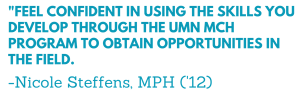
Many MCH students, myself included, wonder how to track themselves for this type of dynamic public health career. Being an MCH student at the UMN is a great start: Nicole states that the “world class” School of Public Health equipped her with skills that have shaped her career “phenomenally.” Nicole believes that many of the required classes–such as grant writing, evaluation, epidemiology and policy–in the MCH Program really do set students up for career success. Nicole stresses that being a good grant writer is especially important, as she explains with a laugh, “if you don’t have a grant you don’t have funding for your career.”
As a student, Nicole ambitiously pursued three different jobs that individually fostered integral public health skills. Working as a research assistant for the Center for Leadership Education for MCH she improved her writing skills. Nicole was also a research assistant with the Tobacco Use Research Center on campus, which developed her research capabilities. For her field experience Nicole traveled to Washington, DC for the summer and helped build the MCH Navigator for the MCH Bureau. Connections she made while at the Bureau allowed her to continue working with the agency through her second year of school.
Tips for Current Students
Nicole wants students to feel confident in using the skills they develop through the UMN MCH Program to obtain opportunities in the field. She encourages students to sell their expertise, advocate for their careers by asking if people are hiring or will have an informational interview with you and by continually trusting that people will help you.
She states that the “entire way her career has moved forward” was through advocating for herself and using the connections made with people in the field to find job and volunteer opportunities.
Upon graduating from the School of Public Health, Nicole worked for the University of Wisconsin-Madison Department of Surgery as a project manager on studies related to decision-making for end of life care and breast cancer treatment. Even though this job did not line up completely with her interest area of women’s sexual and reproductive health, Nicole feels thankful to have worked on both sides of the life course. She also stresses that even though the subject content may look different than what she does now, key public health concepts–such as health behavior, medical decision-making, understanding what makes good research and how to accurately assess outcomes–is integral in her work today.

Based on her own experience, she advises students to not be deterred and discouraged if their first or second jobs out of the Program are not in a specific area of interest. She believes that students who have an open mind will be surprised by how they can apply MCH theories and skills in areas that they didn’t originally think about. Nicole is confident that any skills MCH students develop along the way will ensure they are eligible for that dream job when it does arise, the same way it did for her when she landed the position with Denver Public Health. While acknowledging that her time in research was integral to her career, she finds her current employment enormously satisfying as she begins to see the direct impact her intervention has had on HPV vaccination awareness and rates. As she states: “I really like the ability to make real change for the residents in my community.”
Learn More
To learn more about what Nicole Steffens and her colleagues are doing for HPV prevention in Colorado, check out their website here.
Want to know about the work of other MCH alumni? Visit our alumni page.
Interested in learning more about getting a degree in MCH? Visit our MCH Program page for more information.
Virginia Pendleton is a graduate student in the University of Minnesota School of Public Health, Maternal and Child Health Program. Her background and interests are women’s health, reproductive health and child psychology.
The staff and faculty of the Center for Leadership Education in Maternal and Child Public Health are grateful to Virginia and Nicole for contributing their time and talents in the writing of this piece.
#UMNMCH #UMNproud #UMNdriven
